2016
Islamophobia and the Trump Campaign

The Meth Vote
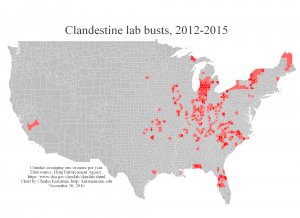 Charles Kurzman, “The Meth Vote,” November 29, 2016. This fall, the Department of Health and Human Services released its first detailed estimate of the number of methamphetamine users in the United States. The total: 897,000, located disproportionately in small cities and nonmetropolitan areas. This is Trump country. Counties with the most clandestine drug lab busts — averaging one or more per year since 2012, according to addresses listed online by the Drug Enforcement Agency — supported Donald Trump over Hillary Clinton by a margin of more than 2 million votes, according to preliminary returns. Trump lost the popular vote in the rest of the country. More…
Charles Kurzman, “The Meth Vote,” November 29, 2016. This fall, the Department of Health and Human Services released its first detailed estimate of the number of methamphetamine users in the United States. The total: 897,000, located disproportionately in small cities and nonmetropolitan areas. This is Trump country. Counties with the most clandestine drug lab busts — averaging one or more per year since 2012, according to addresses listed online by the Drug Enforcement Agency — supported Donald Trump over Hillary Clinton by a margin of more than 2 million votes, according to preliminary returns. Trump lost the popular vote in the rest of the country. More…
A Century of Acceleration
 Charles Kurzman, “A Century of Acceleration,” October 31, 2016. Information flies on transcontinental cables. Globalizing markets create massive fortunes, while threatening the livelihood of millions. Crises in remote regions have repercussions across the planet. More and more of us feel pressure to keep up with a world that seems to be racing ahead. That’s the world in 2016, the “age of accelerations,” according to a new book by Thomas Friedman. But that also describes the world in 1916, the subject of a conference I recently attended in Dublin. This conference focused not on Ireland, specifically, but on the global context of revolutions in an era that historian Mark Jones, the conference organizer, labeled the “age of acceleration.” More…
Charles Kurzman, “A Century of Acceleration,” October 31, 2016. Information flies on transcontinental cables. Globalizing markets create massive fortunes, while threatening the livelihood of millions. Crises in remote regions have repercussions across the planet. More and more of us feel pressure to keep up with a world that seems to be racing ahead. That’s the world in 2016, the “age of accelerations,” according to a new book by Thomas Friedman. But that also describes the world in 1916, the subject of a conference I recently attended in Dublin. This conference focused not on Ireland, specifically, but on the global context of revolutions in an era that historian Mark Jones, the conference organizer, labeled the “age of acceleration.” More…
Terrorism Frightens Us ‘Far Out of Proportion’ to Actual Risk
 Greg Toppo, “Expert: Terrorism Frightens Us ‘Far Out of Proportion’ to Actual Risk,” USA Today, September 21, 2016 (paper edition, September 22, 2016). “Q: In 2016, how likely is it that an American will be killed by a terrorist, Muslim or non-Muslim? A: Fortunately, terrorism has been very rare in the United States. … Terrorism frightens people far out of proportion to the actual number of victims — indeed, that is its primary goal: to create a sense of terror.” More….
Greg Toppo, “Expert: Terrorism Frightens Us ‘Far Out of Proportion’ to Actual Risk,” USA Today, September 21, 2016 (paper edition, September 22, 2016). “Q: In 2016, how likely is it that an American will be killed by a terrorist, Muslim or non-Muslim? A: Fortunately, terrorism has been very rare in the United States. … Terrorism frightens people far out of proportion to the actual number of victims — indeed, that is its primary goal: to create a sense of terror.” More….
Also: interview with Michel Martin on The Diane Rehm Show, National Public Radio, September 20, 2016.
Making the United States Plural Again
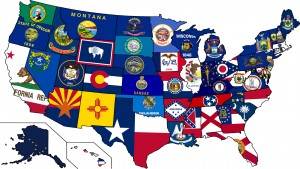 Charles Kurzman, “Making the United States Plural Again,” Scatterplot blog, August 31, 2016. America may be divided these days, but it is hardly as divided as when the United States of America were plural. Over the past two centuries, the United States became singular, at least grammatically, according to my analysis of verbs in the Congressional Record and its predecessor publications — 166 million sentences between 1789 and 1989. More…
Charles Kurzman, “Making the United States Plural Again,” Scatterplot blog, August 31, 2016. America may be divided these days, but it is hardly as divided as when the United States of America were plural. Over the past two centuries, the United States became singular, at least grammatically, according to my analysis of verbs in the Congressional Record and its predecessor publications — 166 million sentences between 1789 and 1989. More…
Data sources and methods can be found here.
The Police Chief: Research in Brief
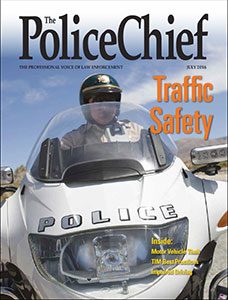 David Schanzer, Charles Kurzman, Jessica Toliver, and Elizabeth Miller, “Research in Brief: The Challenge and Promise of Using Community Policing Strategies to Prevent Violent Extremism,” The Police Chief (International Association of Chiefs of Police), July 2016, pp. 14-15. “Five years ago, the White House issued a strategy calling for the development of partnerships between police and communities as the key element of an effort to counter violent extremism (CVE) in the United States. The authors’ research assesses the challenges and promise of this strategy, based on a survey of U.S. law enforcement agencies and hundreds of hours of interviews and site visits with police departments and community members.” More… Survey data available at ICPSR.
David Schanzer, Charles Kurzman, Jessica Toliver, and Elizabeth Miller, “Research in Brief: The Challenge and Promise of Using Community Policing Strategies to Prevent Violent Extremism,” The Police Chief (International Association of Chiefs of Police), July 2016, pp. 14-15. “Five years ago, the White House issued a strategy calling for the development of partnerships between police and communities as the key element of an effort to counter violent extremism (CVE) in the United States. The authors’ research assesses the challenges and promise of this strategy, based on a survey of U.S. law enforcement agencies and hundreds of hours of interviews and site visits with police departments and community members.” More… Survey data available at ICPSR.
The Iranian Revolution and the Arab Uprisings
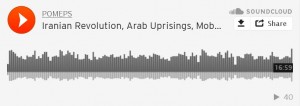 Marc Lynch with Charles Kurzman, “Iranian Revolution, Arab Uprisings, Mobilization,” POMEPS Conversation 71, June 13, 2016. “There’s the sense of disillusionment when things don’t turn out well. The hopes and dreams that come crumbling down when the new institutions turn out not what you thought they ought to be. We saw this in Iran, when a huge portion of the population that was so active in bringing down the shah, then feels that their revolution was hijacked. This new Islamic Republic doesn’t represent what they meant at all. We see it again after the uprisings of the Arab Spring; huge portions of the populations saying, ‘No, no. This isn’t what we wanted.'” More…
Marc Lynch with Charles Kurzman, “Iranian Revolution, Arab Uprisings, Mobilization,” POMEPS Conversation 71, June 13, 2016. “There’s the sense of disillusionment when things don’t turn out well. The hopes and dreams that come crumbling down when the new institutions turn out not what you thought they ought to be. We saw this in Iran, when a huge portion of the population that was so active in bringing down the shah, then feels that their revolution was hijacked. This new Islamic Republic doesn’t represent what they meant at all. We see it again after the uprisings of the Arab Spring; huge portions of the populations saying, ‘No, no. This isn’t what we wanted.'” More…
Waves of Democratization, Waves of Disillusionment
![]() Charles Kurzman, “Waves of Democratization, Waves of Disillusionment: The Arab Spring in Historical Perspective,” Project on Middle East Political Science (POMEPS), June 7, 2016. “Most new democracies fail. They dissolve into civil wars, or are overtaken by coups or collapse under authoritarian bureaucrats and demagogues. They fade into obscure paragraphs in history books. Who remembers the Iranian constitution of 1906 or the Ottoman parliament of 1909, for example? Who remembers the Azerbaijani parliament of 1918 or the Egyptian revolution of 1919 or the Kuwaiti council of 1921? Perhaps the Arab Spring will suffer a similar fate – to be forgotten or dismissed for not having lived up to its hope. More…
Charles Kurzman, “Waves of Democratization, Waves of Disillusionment: The Arab Spring in Historical Perspective,” Project on Middle East Political Science (POMEPS), June 7, 2016. “Most new democracies fail. They dissolve into civil wars, or are overtaken by coups or collapse under authoritarian bureaucrats and demagogues. They fade into obscure paragraphs in history books. Who remembers the Iranian constitution of 1906 or the Ottoman parliament of 1909, for example? Who remembers the Azerbaijani parliament of 1918 or the Egyptian revolution of 1919 or the Kuwaiti council of 1921? Perhaps the Arab Spring will suffer a similar fate – to be forgotten or dismissed for not having lived up to its hope. More…
Well Said: America and Terrorism
 Charles Kurzman, “America and Terrorism,” interview with Brandon Bieltz on UNC-Chapel Hill’s Well Said podcast, April 27, 2016. In this week’s episode of the Well Said podcast, sociology professor Charles Kurzman discusses terrorism and his research on the small number of Muslim-Americans who join militant groups. More…
Charles Kurzman, “America and Terrorism,” interview with Brandon Bieltz on UNC-Chapel Hill’s Well Said podcast, April 27, 2016. In this week’s episode of the Well Said podcast, sociology professor Charles Kurzman discusses terrorism and his research on the small number of Muslim-Americans who join militant groups. More…
When Republicans Needed Muslim Allies
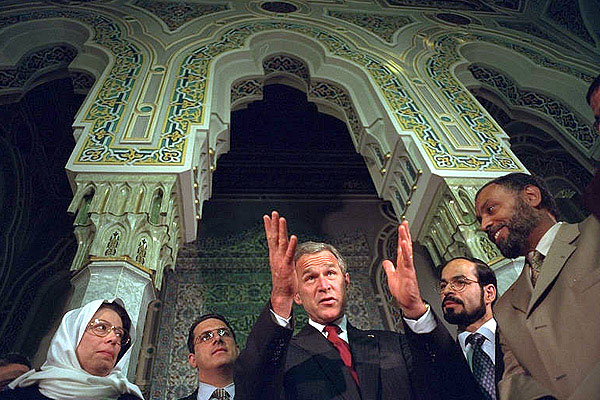 Charles Kurzman, “When Republicans Needed Muslim Allies,” March 31, 2016. “One week after 9/11, President George W. Bush visited a mosque two miles from the White House and delivered a speech on Islam that today’s Republicans could learn from, especially in the wake of the terrorist attack in Brussels. Unlike today’s Republican leaders, President Bush recognized that preventing Islamic terrorism required Muslim allies, and his appearance at the Islamic Center of Washington, alongside Muslim-American leaders, focused on this alliance.” More…
Charles Kurzman, “When Republicans Needed Muslim Allies,” March 31, 2016. “One week after 9/11, President George W. Bush visited a mosque two miles from the White House and delivered a speech on Islam that today’s Republicans could learn from, especially in the wake of the terrorist attack in Brussels. Unlike today’s Republican leaders, President Bush recognized that preventing Islamic terrorism required Muslim allies, and his appearance at the Islamic Center of Washington, alongside Muslim-American leaders, focused on this alliance.” More…
Crossword Cosmopolitanism
 Charles Kurzman, “What Crossword History Tells Us About the Language We Use,” New York Times, February 7, 2016. “We are more parochial than our grandparents’ generation, according to one indicator: The New York Times Crossword Puzzle. With the permission of Will Shortz, the Times’s puzzle editor, I recently downloaded all of the newspaper’s crosswords, from February 1942, when the puzzle began, through the end of 2015. I created an algorithm to search all 2,092,375 pairs of clues and answers for foreign language words and place names outside the United States.” More…
Charles Kurzman, “What Crossword History Tells Us About the Language We Use,” New York Times, February 7, 2016. “We are more parochial than our grandparents’ generation, according to one indicator: The New York Times Crossword Puzzle. With the permission of Will Shortz, the Times’s puzzle editor, I recently downloaded all of the newspaper’s crosswords, from February 1942, when the puzzle began, through the end of 2015. I created an algorithm to search all 2,092,375 pairs of clues and answers for foreign language words and place names outside the United States.” More…
- The article’s charts and methods, for those who are interested, can be found here.
Muslim-American Involvement with Violent Extremism, 2015
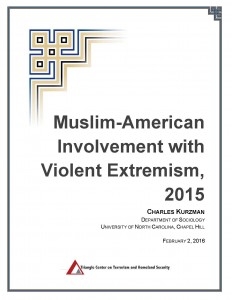 Charles Kurzman, “Muslim-American Involvement with Violent Extremism, 2015,” February 2, 2016. Eighty-one Muslim-Americans were associated with violent extremist plots in 2015, the highest annual total since 9/11. A majority of the individuals identified in 2015 involved travel or attempted travel to join militant groups based in Syria, bringing the total number of Americans who have traveled to Syria sibnce 2012 to 41. Of the Muslim-Americans associated with violent extremism in 2015, three quarters were arrested or identified in the first half of the year. Only one quarter of these plots occurred in the second half of the year, although this decline was overshadowed by the shooting at a social service agency in San Bernardino, California, in December 2015, that killed 14 people and injured 17. More, including data…
Charles Kurzman, “Muslim-American Involvement with Violent Extremism, 2015,” February 2, 2016. Eighty-one Muslim-Americans were associated with violent extremist plots in 2015, the highest annual total since 9/11. A majority of the individuals identified in 2015 involved travel or attempted travel to join militant groups based in Syria, bringing the total number of Americans who have traveled to Syria sibnce 2012 to 41. Of the Muslim-Americans associated with violent extremism in 2015, three quarters were arrested or identified in the first half of the year. Only one quarter of these plots occurred in the second half of the year, although this decline was overshadowed by the shooting at a social service agency in San Bernardino, California, in December 2015, that killed 14 people and injured 17. More, including data…
Community Policing to Prevent Violent Extremism
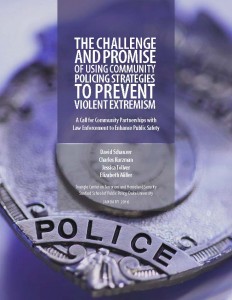 David Schanzer, Charles Kurzman, Jessica Toliver, and Elizabeth Miller, “The Challenge and Promise of Using Community Policing Strategies to Prevent Violent Extremism,” Triangle Center on Terrorism and Homeland Security, January 2016. “Policing agencies face multiple obstacles to creating community partnerships focused on preventing acts of violent extremism. But … some policing agencies are following a set of promising practices which, if applied effectively, can result in increasing trust between the police and the communities they serve. These trusting relationships can serve as a platform for addressing many public safety threats, including, but not limited to, violent extremism.” More… Survey data available at ICPSR.
David Schanzer, Charles Kurzman, Jessica Toliver, and Elizabeth Miller, “The Challenge and Promise of Using Community Policing Strategies to Prevent Violent Extremism,” Triangle Center on Terrorism and Homeland Security, January 2016. “Policing agencies face multiple obstacles to creating community partnerships focused on preventing acts of violent extremism. But … some policing agencies are following a set of promising practices which, if applied effectively, can result in increasing trust between the police and the communities they serve. These trusting relationships can serve as a platform for addressing many public safety threats, including, but not limited to, violent extremism.” More… Survey data available at ICPSR.